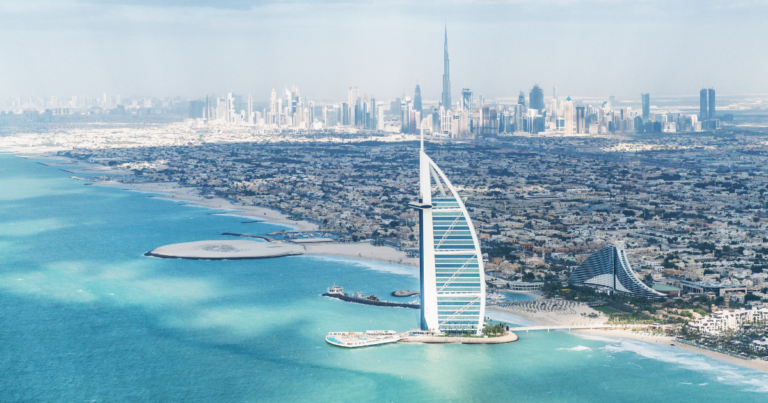Global uncertainty and trade wars be damned. The real estate market in billionaires’ playground Dubai and other parts of the United Arab Emirates (UAE) continues to fire on all swanky cylinders. The iconic Dubai skyline is so jam-packed that there’s a debatable rumour circulating that a quarter of the world’s cranes are there.
A global business hub, this once tranquil desert region on the Persian Gulf is now among the hottest markets on the planet – in more ways than one, seeing as summer temperatures have been known to climb to a searing 50 degrees Celsius.
Even the bus stops are air-conditioned.
A ‘land of opportunity’
The UAE’s real estate sector is booming, buoyed by business-friendly policies; a surge in demand for luxury properties by high net-worth buyers; an exploding population; attractive rental yields potentially upwards of seven per cent; impressive infrastructure (including Burj Khalifa, the world’s highest skyscraper); a high standard of living and low crime rate; and a diversified economy that’s greatly reduced dependence on oil revenue.
“It’s the new land of opportunity,” asserts Ontario-based Engel & Völkers broker/advisor Peter Kolisnyk, who frequently helps international clients source investment properties there. “The UAE welcomes your money.”
Let’s not overlook the biggest perk – there’s no income tax there.
No taxes on capital gains or rent.
And no property tax.
“The younger demographic sees the opportunity to make a fresh start and keep 100 per cent of their income. It’s not nearly as onerous as it is here as an immigrant to re-qualify in your career. In my opinion, some of the best and brightest are now going to places like Dubai,” says Kolisnyk. “It’s incredible to see such a large demographic of young people in the shopping malls, on the beach, and in stores and restaurants.”
Influx of outsiders
The vast majority of the UAE’s 11-million population “are transplants,” Kolisnyk explains.
“There are so many immigrants from all over the world. It’s very cosmopolitan.”
Dubai, followed by oil-rich Abu Dhabi, are the primary UAE luxury markets when it comes to attracting ex-pats, professionals, and investors. Dubai is considered to be the most liberal of the seven emirates, with Abu Dhabi somewhat more traditional and slower paced. (Expect zero tolerance in either where recreational drugs are concerned, including marijuana. The high life comes with some cultural adjustments.)
Recently, demand has stretched to neighbouring emerging communities like Ras Al Khaimah, where Wynn Resorts will open an enormous hotel complex on the Arabian Gulf in 2027, along with the first casino in the country – quite a feat, given that Islamic law prohibits locals from gambling.
The $5-billion resort on a man-made archipelago, poised to become an investment hotspot, will seemingly embrace the notion that the UAE is the Vegas of the Middle East. It will include 24 restaurants, 12 pools, a host of designer boutiques, and a private marina.
Doing business in Dubai
Not surprisingly, it isn’t cheap to live in the UAE. Even the police force drives Ferraris. The property market, though, is still competitively priced by global standards. Prices are rising, of course. And the top end is decidedly on its own soaring trajectory.
“It can go ridiculously high. There are some $30+ million condos,” says Khaled Nasser, Re/Max region owner for the UAE.
Agents can do extremely well in this dynamic market. “A portion of them make a killing,” Nasser confirms.
Builders may offer incentivizing commissions of five to eight per cent, but competition is fierce and there are “a lot of struggling agents who don’t know how to market themselves,” along with brokers who view their salespeople more as employees than independent contractors, from Nasser’s perspective.
A common commission for residential resale in Dubai is two per cent, and sellers generally don’t sign exclusive contracts. The brokerage’s cut is usually 50 per cent. With rental transactions, the commission tends to be five per cent of the annual rent.
On the horizon
While the UAE has an increasingly active resale market, the industry is highly focused on “a massive pipeline of new inventory” – urban condos, apartments, new waterfront homes, townhouses, luxury villas, commercial developments – with buyers financing via builder/developer payment plans rather than a traditional mortgage process, according to Nasser.
There’s a clear and transparent regulatory framework. Contracts are standardized and transactions are easily handled electronically, no ‘wet’ signatures required. Realtors (called brokers there) are trained and licensed. There’s no unified MLS though, no consolidated national association for real estate professionals, and limited collaboration between salespeople from different brokerages, Nasser has found.
The UAE is cracking down aggressively on money laundering, he points out. This and cybercrime remain ongoing concerns.
Although the UAE doesn’t offer traditional permanent residency status, its Golden Visa long-term residency program, popular with investors, potentially opens a path to extended residency. Foreigners buying property can do so only in designated freehold areas, which include many of Dubai’s most exclusive neighbourhoods, among them Emirates Hills and Palm Jumeirah.
Robert Villalobos, who heads up Engel & Völkers’ Dubai brokerage, notes that “given Dubai’s highly international population, our advisors regularly work with clients from all over the world. This means cultural awareness, multilingual communication, and understanding foreign processes are especially valuable.” He affirms that the city offers significant earning potential “for those who are driven and committed.”
With its “lifestyle appeal, world-class amenities, safety and security, leading schools, healthcare, and a central global location,” Dubai continues to see “consistent transaction volume across both end user and investor segments,” Villalobos verifies.
When you land in Dubai, you’re stepping into the busiest airport in the world. It’s hard to grasp that 55 years ago, this city of gold was just a small fishing village with the vast Arabian desert rippling out around it.
Susan Doran is a Toronto-based freelance writer who has been contributing to REM since its very first issue.
